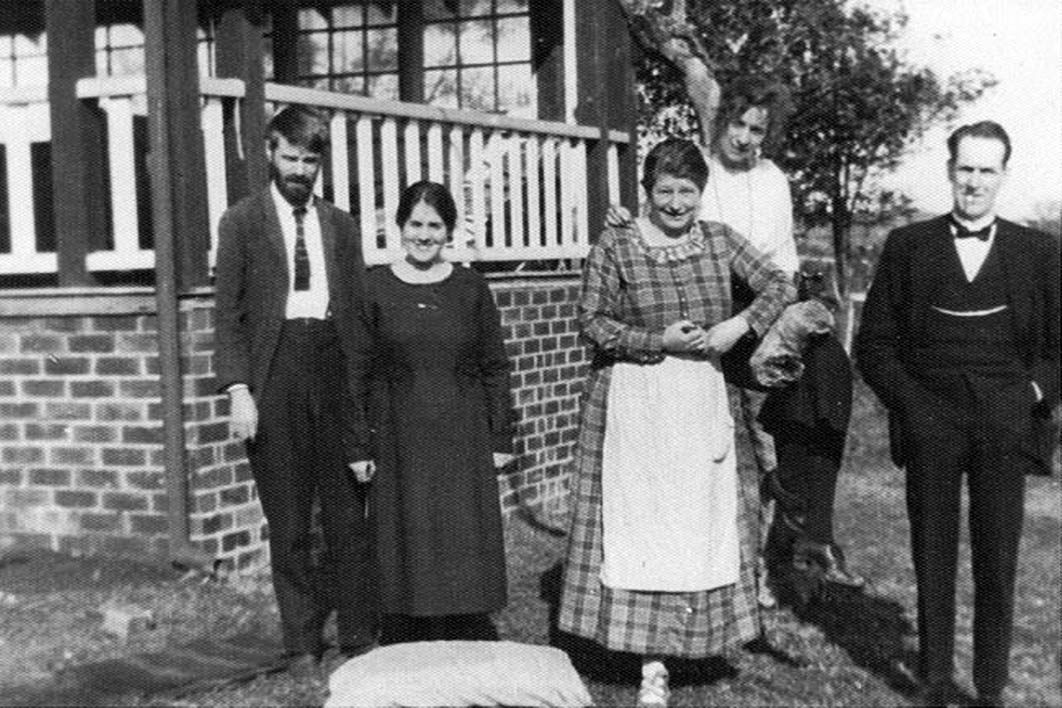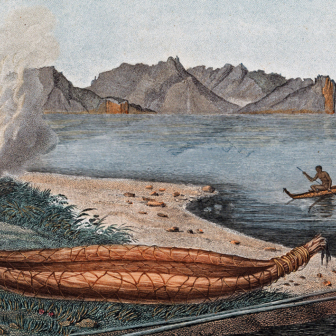D.H. Lawrence and his wife Frieda spent several months in Australia during 1922, mostly living at Thirroul, south of Sydney. There, Lawrence worked on his novel Kangaroo, which is released as a Text Classic this week. In this article — first published in the fortnightly magazine Nation in October 1958 — editor and journalist Tom Fitzgerald recalls a visit to Thirroul and an encounter with Lawrence’s barber.
Malcolm Muggeridge, mentioned in the opening paragraph, was a well-known British journalist who spent several months in Australia during 1958. Scottish-born John Pringle, usually known as John Douglas Pringle, was editor of the Sydney Morning Herald 1952–57 (and again, 1965–69); his observations about Kangaroo were made in his book Australian Accent, published in 1958. Richard Rees was a British diplomat, writer and painter.
It was Malcolm Muggeridge a few months ago and now it is John Pringle, former editor of the Sydney Morning Herald, who is candidly using D.H. Lawrence’s thirty-six-year-old novel, Kangaroo, as a crib-book to help in conveying the visiting Englishman’s impressions of Australia. Since Lawrence’s intuitions about this country (extolled again the other day in Sir Richard Rees’s book Brave Men) are still the inspiration and the despair of visiting writers, it is surprising that nobody has remarked the really big prophecy to which his antennae finally directed him: the prophecy that there would not be an enduring White Australia.
There has always been something tantalising about the oblique, unreasoned but assured way that Lawrence stated this belief, not only in the novel but also in one of the great letters he wrote from Thirroul to his wife’s relations in Germany. It is one reason why I have sometimes loitered in Thirroul when passing down the South Coast; and it is how I have come to know the resident who certainly had most to say to Lawrence in 1922 and is the only Australian to be given a clearly identifiable appearance in Kangaroo. It is a small but interesting appearance, and though this man has never sought publicity it is a wonder that today’s vast Lawrence industry has not caught up with him.
He is Mr G.S. Laughlin, the hairdresser, who is still conducting his business, though his shop has been moved a couple of hundred yards around the corner on to the main street since Lawrence’s day. Thirroul’s landmark and pride nowadays is Mr L.J. Hooker’s Rex Hotel, several times bigger than any other building in the town. Few of the residents are aware that their seascape and landscape have been portrayed as no other part of Australia has been. The old jetty, where Lawrence expected to keep an eternal rendezvous, has long been out of use and three-parts sunk into the sea; but the cottage “Wyewurk” has been kept in excellent condition by the Mrs Southwell who rented it through an agent to the Lawrences — it is a much more pleasing memorial than the shrine they have built for Lawrence in New Mexico.
Mr Laughlin, like the other residents of Thirroul who know about Lawrence, thinks the novel was unfriendly and offensive to the people as distinct from the scenery. This accords with his own memories of Lawrence: “The most morose-looking fellow you ever met.” Lawrence would come in for a trim of his “gingery kind of beard.” Sitting in the chair, he ignored the ordinary give-and-take of conversation but would ask innumerable questions. There would be silences while he considered some of Mr Laughlin’s answers, then more terse questions. He came frequently during his two-months stay, more often than the friendly Frieda, and whether deliberately or not he would arrive in the slack part of the afternoon when he could have the place to himself for longest. “I don’t think,” Mr Laughlin says, “that he really came to have his beard trimmed but to ask his questions.”
Mr Laughlin is a dignified, slimly built man of about sixty, with strong white hair and fine features, and wearing glasses. His natural reserve is tempered by a sympathetic interest in discussing the “funny” man who lived such a funny, unsettled life (“he had no friends”), and has now achieved so much fame.
The questions he remembers being asked do not bear much on the matter of a white-skinned Australia. They were mainly questions about rock formation in the great ridge (Lawrence’s “dark tor”) running down from the Bulli Lookout, about trees and ferns and the shaft workings in the coalmines. For all Lawrence’s feeling that “the people of Australia ought to be dusky,” Mr Laughlin is sure he was the kind of person who could never go tan himself: “He had that ginger hair and pale skin that goes red in the sun and then only more red.”
This is not the place to go far into Lawrence’s theory about skin colour. It was intuitive rather than rational, and he had always preferred brown skin to white. He was not thinking, for instance, of an imminent invasion; on the contrary, he seemed to think that the obsession he found here in 1922 about the military threat from Japan was overdone. Nor was it a conscious matter of comparing latitudes, of weighing the fact that Brisbane lies as near to the equator as New Delhi while even Melbourne is on a similar parallel to Tunis. It was something to do with the landscape. He didn’t understand it himself. By some mystical process he thought he heard “a dusky, far-off call that he knew would go on calling for long ages before it got any adequate response, in human beings.” In a letter to Germany, he even intimated the time interval that would be needed:
This is the land where the unborn souls, strange and unknown, that will be born in five hundred years, live. A grey, strange spirit, and the people that are here are not really here: only like ducks that swim on the surface of the lake. But the country has a fourth dimension and the white people float like shadows on the surface… I say a new country is like sharp wine in which floats like a pearl the soul of an incoming people till this soul is melted or dissolved. But this is stupid.
It is easy and diverting now to see the difficulties that anybody would have had in making conversation with the truculent, high-voiced little man in Mr Laughlin’s chair at that point of time. In his Australian period, Lawrence was at grips with the question of whether a sage like himself should assume political leadership, not over one country but many. He was also in the phase of trying to assert absolute male dominance over the female, and between his visits to the barber there were fearsome rows at “Wyewurk” about who should be wearing the trousers. One afternoon, too, the dark sky put him in mind of his bitter wartime experiences in Cornwall, and made him live that over again for days.
To cap it all, the Australian accent has unexpectedly brought out a touch of the Imperial Englishman in Lawrence. The initials he gave to his vicarious self, Richard Lovat Somers, in Kangaroo imply that he was matching himself against, and taking up the mantle of, R.L. Stevenson, the previous important literary man who had come and written in the South Seas. He was right and we were lucky. More famous names at the time, like Galsworthy, Maugham, Conrad and Kipling, passed by without detecting suitable literary material in Australia. The only genius among them, the great confider of quick but brilliant impressions, was Lawrence.
He came to the Australia of 1922 as something of a world champion in hypercritical, hard-to-please invective. He had recently attacked the great Keynes and Bertrand Russell as inhuman “black beetles,” words that troubled them for twenty and thirty years afterwards. He had rowed with most members of London’s literary set and shaken its dust from his feet. Nor were the dead spared; just before embarking for these waters he had thrown a memorable dart at Dante for having made so much fuss about an ethereal love for Beatrice “when all the time he had a cosy, bifurcated wife in his bed, and a family of lusty little Dantinos.” Even while coming down on the P&O liner to Australia he was shaking an angry fist and writing unprintable letters to the woman, Mabel Dodge, who was beckoning him across to New Mexico.
Against these dire forebodings, Australia emerged from his scrutiny well, and I think it can be shown that Mr Laughlin had a part in that. At first, Lawrence was very severe. The little-known letters to Germany were and are devastating:
The people are so crude in their feelings — and they only want to be up-to-date in the “conveniences,” electric light and tramways and things like that. The aristocrats are the people who own the big shops — and there is no respect for anything else. The working people are very discontented — always threaten more strikes — always more socialism… Nothing really matters. But they let the little things matter sufficiently to keep the whole show going. You never knew anything so nothing, nichts, nullus, niente, as the life here… That’s what the life in a new country does to you: it makes you so material, so outward, that your real inner life and inner self die out, and you clatter around like so many mechanical animals.
In two months, however, he was acclimatised. The lackadaisical heartiness, the colonial jocularity, that had horrified him at first began to creep into Kangaroo. The structure of the book threatens to collapse. He stands off and laughs at himself as a would-be politician and masterful husband. He interposes between the reader and the novel’s characters, for all the world like another Joseph Furphy, to joke about “this gramophone of a novel” or to say, “I hope, dear reader, you like plenty of conversation in a novel,” and so on. It is the best-humoured of all his novels, though he felt he would write little more if he stayed here.
For all its rough edges, he decided, this might be the beginnings of the ideal society — “it might happen here in wonderful Australia.” The simplicity of human relations, the relative freedom from the rat-race of one-upmanship, impressed him. The final chapter and a half of the novel are a great rising paean of praise. If benign, slow-moving Australia, like Frieda herself, never had such a scowling lover, it has never had such an eloquently passionate and comprehending one, either. He imagined himself considering an offer to edit a labour newspaper so as to bring out the people’s full personality. “Now, Mr Somers, here’s your chance… Deep calleth to deep. And the trouble with us here is, no one calls to our deeps; they lie there stagnant.” By now, his stomach having become adjusted to all the right-oh, my-word and by-gees, it was the people as well as the country that appealed to him. “That was the beauty of the men,” he wrote: “their absolute lack of affectation, their naive simplicity which was at the same time sensitive and gentle. The gentlest country in the world. Really, a high pitch of breeding. Good breeding at a very high pitch, innate, and in its shirtsleeves.”
Of this good breeding in shirtsleeves, there seems to be no question who was the most important exemplar in Lawrence’s eyes. Twelve years afterward, when Lawrence was long dead, Frieda seems to have been remembering some references he had made to Mr Laughlin when she sent the barber a signed copy of her book of reminiscences. Nobody else in Thirroul was sent one. And only Mr Laughlin’s gentle modesty has prevented him from seeing the extraordinarily rare compliment contained in the words his gruff interrogator wrote in Kangaroo: “the barber, a young intelligent gentleman in eyeglasses.” •




